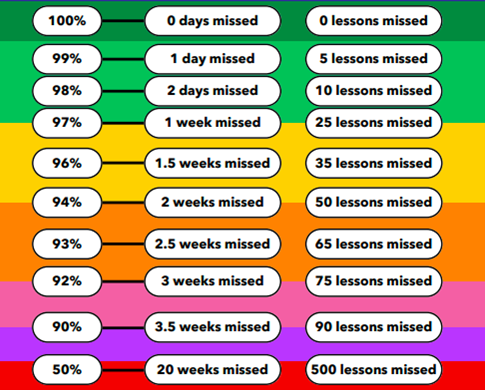Attendance
Rye College has high expectations for every student’s attendance.
All our students deserve the opportunity to secure high GCSE grades that enable them to gain their dream job in the future and become model citizens with real-world skills.
We have an expectation that students are in school at least 96% of the time.
Student attendance is measured as a percentage. This reflects the number of days a pupil attends out of the 190 school days each year. When a student’s attendance is below 100%, the percentage equates to the number of days and lessons that the pupil has missed.

Absence
We know that sometimes our students cannot come to school because they are really unwell – and that's the right thing to do for them and other students. Medical advice is clear: children with mild illnesses are often well enough to attend, for example, if they have a cough, or cold, without a temperature.
NHS guidance Is my child too ill for school? - NHS (www.nhs.uk) is designed to support parents in their decision making about mild illness.
We also know that students fall behind their friends and classmates when they miss school. At our school, we want the amount of missed education to be reduced as much as possible. We believe that our community is stronger together, with all our students in school, on time, every day. We are building life skills, life-long friendships and preparing your child for future success.
Attendance expectations
What YOU must do:
- Contact the school before 8.30am each day of your child’s absence.
- Tell the school in advance of any medical appointments and bring in appointment cards or letters.
- If you are not sure whether your child is well enough to attend school, send them in anyway as they often perk up on arrival.
- Have a back-up plan if your child misses transport: call on a family member, neighbour or friend.
- If you and your child are experiencing difficulties with school attendance, then talk to us as a first step so we can help!
What WE will do:
- Check your child’s attendance every day.
- Phone home to discuss your child’s attendance with you.
- Invite you into school for attendance meetings if we are concerned.
- If we cannot establish a reason for absence, then we may make a welfare visit to your home.
Supporting School Attendance & Wellbeing
At Rye College, we understand that regular school attendance can be affected by a range of challenges. Whether it's physical health, mental wellbeing, sleep issues, or family pressures, we’re here to help.
Below is a list of trusted resources to support your child and family—alongside local services available in the Hastings and Rother area.
Supporting School Attendance and Wellbeing
How you can help your child attend regularly
- Make sure they understand the importance of good attendance and punctuality.
- Take an interest in their education: ask about schoolwork and encourage them to get involved in school activities.
- Discuss any problems they may have at school: inform their teacher or the attendance officer about anything serious.
- Do not let your child take time off school for minor ailments – particularly those which would not prevent you from going to work.
- If your child is well enough to attend but requires medication such as paracetamol to manage symptoms, we are happy to administer it during the school day. Please ensure you complete and sign the medication consent form to give us permission to do so.
Rye College Parental Medical Consent Form
- Arrange appointments and outings after school hours, at weekends or during school holidays to prevent disruption to your child's education and to the school.
Lateness
We know that mornings can be difficult for some pupils but a punctual start to the school day is essential.
Absence due to exam worries
We know parents worry about their child’s mental health. Families must remember that mild anxiety, whilst sometimes a difficult emotion, is normal. In many instances, attendance to school may help with the underlying issue more than being away from school, which might make it worse. Rather than keeping your child away from school during this time, encourage your child to attend school and let us know about your worries so that we can work together on supporting your child.
Download the DFE Guide for Parents on School Attendance
